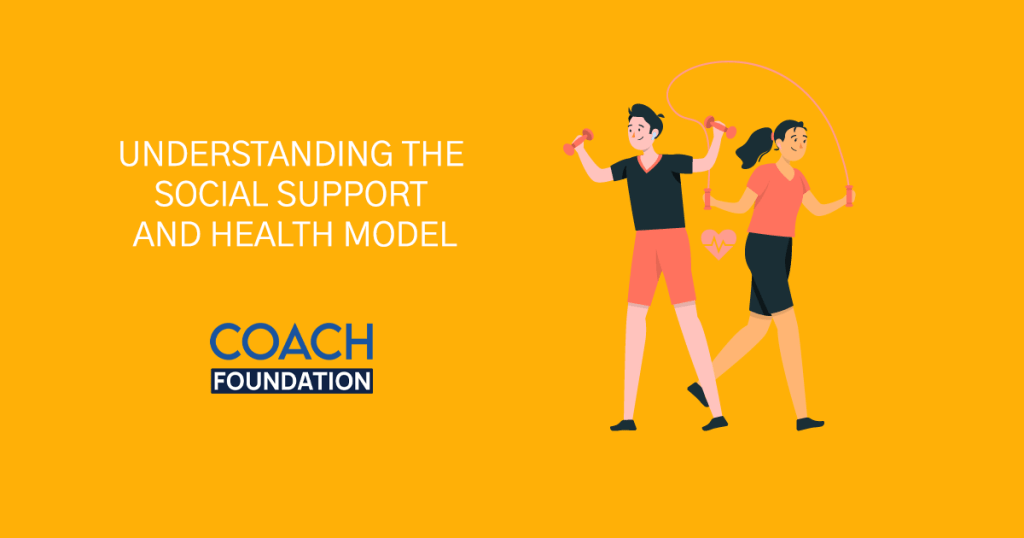Blog » Coaching Models and Techniques » Understanding The Social Support And Health Model
Understanding The Social Support And Health Model
Social support can come from a variety of sources, including family, friends, and community networks. The Social Support and Health Model is a framework that explores the relationship between social support and health outcomes. By understanding this model, you’ll gain valuable insights into the benefits of social support, the different types of support available, and how to build and maintain a robust network.

Recognizing the importance of relationships in promoting positive health outcomes allows you to harness their power to improve your own life.
So if you’re ready to explore how social support influences your health journey, keep reading as we uncover all there is to know about this fascinating model.
Key Takeaways
– Having a strong support network positively impacts well-being
– Social support reduces stress levels and buffers against the negative effects of stress
– Different types of social support include emotional, informational, and instrumental support
– Building and maintaining a strong social support network requires seeking out meaningful connections
What is the Social Support and Health Model?
The Social Support and Health Model explores how the connections you have with others can impact your overall well-being. It suggests that having strong social support networks can positively affect your physical and mental health.
Research has consistently shown that people who have a supportive network of family, friends, and community tend to experience better health outcomes compared to those who are socially isolated.
One way in which social support influences health is by reducing stress levels. When you have people who care about you and offer emotional or practical assistance during challenging times, it can help alleviate stress.
A thorough analysis of the data reveals that the presence of social support provides a sense of belonging, validation, and comfort, which in turn can buffer against the negative effects of stress on your body and mind.
Another benefit of social support is its potential to encourage healthier behaviors. When you surround yourself with people who prioritize their own well-being, it can motivate you to do the same. For example, if your friends engage in regular exercise or eat a nutritious diet, you’re more likely to adopt these habits as well.
Additionally, having someone to share activities such as walking or cooking healthy meals with can make them more enjoyable and sustainable.
The Benefits of Social Support for Health and Well-Being
Surrounded by close friends and family, you experience a sense of belonging that positively impacts your overall well-being. Social support plays an important role in promoting good health and mental well-being.
Here are four benefits of social support for your health and well-being:
1. Emotional Support
Your loved ones provide emotional support by listening to your problems, offering reassurance, and showing empathy. Well-established theories in the field assert that having someone who understands and cares about your feelings can help you cope with stress, reduce anxiety, and improve your mood.
2. Practical Support
Social support also includes practical assistance, such as help with daily tasks or financial aid during challenging times. The prevailing consensus among experts is that knowing that you have someone to rely on when you need it can alleviate the burden on you and contribute to better physical health.
3. Informational Support
Your social network can provide valuable information about health-related topics like healthy lifestyle choices or available medical resources. Access to accurate information enables you to make informed decisions about your health and seek appropriate care when necessary.
4. Social Integration
Engaging in social activities with supportive people promotes a sense of belonging and reduces feelings of loneliness or isolation. Participating in group activities or being part of a community allows for meaningful connections that foster positive mental well-being.
Types of Social Support
Engaging in meaningful connections with supportive people can provide a strong sense of belonging while also reducing feelings of loneliness or isolation. Having different types of social support can significantly impact your overall well-being.
Emotional Support
Emotional support, for example, involves having someone to confide in and share your feelings with during challenging times. This type of support can help you manage stress better and cope with difficult situations.
Having emotional support from friends or family members who genuinely care about your well-being is crucial for maintaining good mental health. It allows you to express your emotions freely without fear of judgment or rejection.
Informational support
Informational support provides guidance and advice when you need it, while instrumental support refers to tangible assistance such as financial aid or practical help with daily tasks. By understanding the different types of social support available to you, you can build and maintain a strong social support network that enhances your overall health.
Furthermore, informational support plays a vital role in helping you make informed decisions about your health by providing reliable information or resources related to medical conditions, treatment options, or lifestyle changes.
Instrumental Support
Instrumental support involves more practical forms of assistance, like offering transportation for doctor’s appointments or helping with household chores when you’re ill. Such tangible acts show that others are there to lend a hand when needed, reducing stress levels and promoting overall wellness.
Building and maintaining a strong social support network requires actively seeking out meaningful connections, nurturing existing relationships through regular communication and mutual trust, and being open to giving and receiving various forms of social support.
Application of the Model in Life Coaching
As life coaches, harnessing the transformative power of the Social Support and Health Model can be key to empowering your clients to lead more fulfilled and healthier lives.
The cornerstone of this model lies in understanding and valuing the profound impact of meaningful social connections on overall health. By helping your clients identify, cultivate, and nurture such relationships, you can assist them in experiencing diminished stress levels, enhanced mental health, and fortified resilience in confronting life’s challenges.
Encourage your clients to deepen their ties not just with friends and family, but also to actively participate in their broader communities. This investment in their social networks can have a profound, positive influence on their physical and emotional health.
It’s worth noting that research consistently underlines the importance of robust social support networks for managing stress. Having reliable people who offer solace during trying times provides comforting reassurance, reducing feelings of anxiety and isolation. This “buffering effect” can help shield against the harmful physical effects of stress, from reducing inflammation to boosting immune function.
Furthermore, promoting strong social connections is essential for mental well-being. Fostering relationships where emotional expression is validated fosters a sense of belonging and self-esteem. A trusted confidante for sharing triumphs and trials offers a healthy avenue for emotional processing.
As life coaches, integrating the principles of the Social Support and Health Model can be transformative. By promoting the development and maintenance of strong social relationships, you can facilitate your clients journey towards stress reduction, mental well-being enhancement, and the cultivation of resilience.
Conclusion
In summary, social support theories highlight the significant role that interpersonal connections play in promoting well-being. By fostering meaningful relationships and seeking out sources of support when needed, we can enhance our mental health and overall quality of life.
Remember to prioritize building social connections, as they’re crucial for maintaining a healthy sense of belonging and happiness in your life.
When you actively build and nurture your social support network, you create a foundation for emotional stability and resilience. Having people who genuinely care about your well-being provides a sense of belonging and validation. They offer comfort during difficult times and celebrate achievements with you.
By fostering meaningful connections, you’re creating an environment where you feel safe to share your thoughts, feelings, and experiences without judgment or fear of rejection.
Investing time and effort into building social support is not only beneficial but essential for your overall well-being. It’s through these connections that we find solace, encouragement, and a sense of belonging.
So take the knowledge from this discussion on strategies for building social support and apply it in your own life by actively seeking out opportunities to connect with others.
Frequently Asked Questions (FAQs)
What is the social support and health model?
The social support and health model examines how the presence of a strong social network can positively impact an individual’s physical and mental well-being.
Here are some key points to understand about the social support and health model:
– Emotional support: Having someone to confide in and lean on during difficult times.
– Practical support: Social networks can offer practical assistance, such as helping with daily tasks or providing resources.
– Informational support: Being part of a supportive community allows for the exchange of information, knowledge, and advice related to health issues.
– Appraisal support: Having people who can provide objective feedback and encouragement helps people gain perspective on their situations and boosts self-esteem.
How can social support benefit physical and mental health outcomes?
Social support has been shown to reduce stress levels, boost immune function, and even promote faster recovery from illness or injury. Emotionally, having someone to talk to and lean on during difficult times can provide a sense of comfort and security that helps alleviate anxiety and depression. In turn, this can lead to better sleep patterns, increased energy levels, and an overall improved quality of life.
Engaging in meaningful relationships stimulates the brain and keeps it active, which can help prevent conditions such as dementia or Alzheimer’s disease. Additionally, having supportive friends or family members to share our joys and triumphs with enhances feelings of happiness and satisfaction.
How can coaches apply the social support and health model in their coaching programs?
Coaches can effectively implement the social support and health model in their coaching programs by fostering a sense of community and providing clients with the necessary tools and resources to navigate their wellness journey.
One way coaches can create a sense of community is by encouraging group activities or team-building exercises. By bringing clients together, they can develop relationships, share experiences, and provide emotional support to one another. This sense of belonging can have positive effects on both physical and mental health outcomes.
Coaches play a vital role in applying the social support and health model in their coaching programs. By fostering a sense of community and providing tools and resources, coaches can help clients achieve better physical and mental health outcomes.

ABOUT SAI BLACKBYRN
I’m Sai Blackbyrn, better known as “The Coach’s Mentor.” I help Coaches like you establish their business online. My system is simple: close more clients at higher fees. You can take advantage of technology, and use it as a catalyst to grow your coaching business in a matter of weeks; not months, not years. It’s easier than you think.
AS SEEN ON





